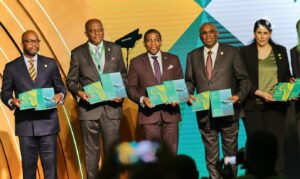The 32nd Annual General Meeting of the African Export-Import Bank (Afreximbank) kicked off in Abuja, Nigeria with a charge to all Africans to demonstrate commitment to economic integration and resilience by ensuring Africa’s economic sovereignty, whiles protecting the continent from global geopolitical tensions.”
The Afreximbank 32nd Annual General Meeting which is themed on “Building the Future on Decades of Resilience” marks a pivotal moment in the bank’s history, celebrating 32 years of significant contributions to Africa’s economic landscape.

Addressing participants at the Afreximbank 32nd Annual General Meeting, Secretary General of the AfCFTA Secretariat, Wamkele Mene reminded Africans that the success of the AfCFTA demands continued political leadership, effective public-private collaboration, and active engagement from all stakeholders, including Africa’s youth, women, and entrepreneurs. “The current global context, marked by geopolitical tensions, wars, and growing economic uncertainty, reminds us of the urgency of self-reliance. Strengthening our internal markets and building resilience is not only an economic goal; it is a strategic necessity.”
The Secretary General who spoke on “Realising the Vision of the African Founders: Progress Towards Africa’s Trade and Economic Integration” echoed, that businesses and business associations, stakeholders and participants at the AGM owe it to their partners and the 1.4 billion fellow Africans, to build an Africa that is strong, self-reliant, and ready to claim its rightful place in the global economy. “We want to see African-made goods and services flowing freely across our borders, generating decent jobs, stimulating industries, and improving livelihoods across the continent.”
The Secretary General emphasized that when the pioneers of African independence like Kwame Nkrumah, Julius Nyerere, Haile Selassie, and others, advocated for a unified continent, they understood that political liberation without economic integration would leave Africa vulnerable to fragmentation, dependency, and underdevelopment. Thus, the bold vision of having a borderless Africa, mobilising its collective potential through shared prosperity, intra-African solidarity, and economic self-reliance.
The Secretary General admitted that achieving the bold vision of economic self-reliance, though has been the guiding principle of the continent’s leaders, has come with many challenges, navigating post-colonial transitions, political turbulence, external economic pressures, and the daunting task of nation-building.

However, he expressed optimism that the flame of integration never died with the establishment of Regional Economic Communities, including ECOWAS, SADC, EAC, COMESA, and ECCAS, laying the crucial groundwork, fostering cooperation and building bridges to test for integration, which has achieved significant milestones in trade facilitation, free movement, and infrastructure development within their respective regions.
But he revealed that the founders envisioned more which is, a truly continental project, built on trade, shared infrastructure, and a common sense of destiny and believes that today, that bold ambition is being realized through decisive, concrete action by establishing and operationalizing the African Continental Free Trade Area (AfCFTA), which represents one of the most ambitious and transformative steps towards continental economic integration since the dawn of Africa’s independence era.










